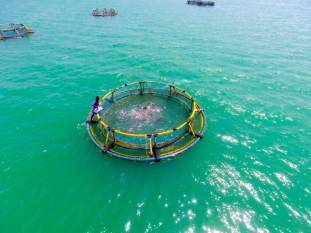KOCHI, 15 October 2023: In a bid to bolster the coastal fish production of India, the ICAR-Central Marine Fisheries Research Institute (CMFRI) has put forward a groundbreaking idea—mariculture parks.
These parks aim to address the surging food and nutritional demands expected in the upcoming years. This proposal was unveiled during a discussion on aquaculture and fisheries-based transformation of food systems at the 16th Agricultural Science Congress (ASC) in Kochi.
Mariculture Parks for Sustainable Growth
The CMFRI envisions setting up mariculture parks in coastal districts where suitable locations have been identified for a range of mariculture activities. These activities include marine cage fish farming and seaweed cultivation. The CMFRI has meticulously identified 46,823.2 hectares of suitable sites for marine cage fish farming in Indian territorial waters, along with 333 promising seaweed farming sites covering 23,950 hectares.
Ecosystem Sustainability and Conflict Mitigation
One of the key objectives of these mariculture parks is to prevent haphazard and unplanned sea farming expansion. Such unplanned expansion can lead to ecosystem disruption, user conflicts, and various social issues. Mariculture parks are designed to promote organized and sustainable growth in the sea farming sector.
Boosting the Mariculture Sector
The establishment of mariculture parks aligns with the crucial strategies required for the growth of the mariculture sector. These strategies encompass comprehensive planning, the promotion of innovative production technologies, infrastructure development, enhanced pro-industry policy making, and the efficient implementation of marine spatial planning in conjunction with other maritime sectors.
Paving the Way for a Sustainable Blue Economy
The CMFRI paper presented at the 16th ASC highlights that establishing mariculture technology parks in Indian territorial waters can pave the path for a sustainable blue economy. This involves integrating indigenous mariculture technologies and strengthening the blue growth strategy advocated by the Prime Minister of India. To achieve this, efforts are required to improve and develop legislation and ocean accounting. This, in turn, will help attain the socio-economic and ecological goals of the country through mariculture ventures.
Indigenous Mariculture Technologies
The CMFRI has made significant strides in developing indigenous mariculture technologies. These technologies cover offshore and nearshore cage fish farming, bivalve farming, seaweed farming, integrated multi-trophic aquaculture practices, and combined farming practices using either seaweed or bivalves alongside cage fish farming.
Addressing Climate Challenges
The discussion also emphasized the need for climate adaptation plans that integrate with fisheries management. These plans should engage scientists, fishers, traders, processors, policy makers, and other stakeholders to tackle the challenges posed by the climate crisis.
In conclusion, the ICAR-CMFRI's proposal to establish mariculture parks promises to revolutionize coastal fish production in India. These parks offer a sustainable solution to meet the increasing demand for food and nutritional resources, while also preserving the marine ecosystem. By adopting mariculture technology parks, India can take a significant step toward realizing its blue economy ambitions and creating a harmonious balance between socio-economic growth and ecological conservation.




















